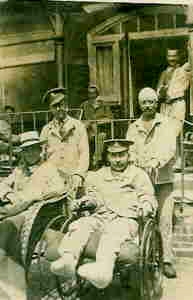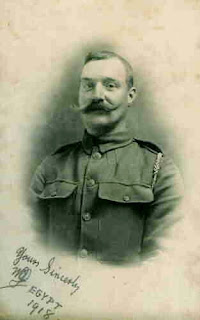WILLIAM JAMES CROMAN
1881 – 1918
Commemorating
100-year Anniversary of his death
100-year Anniversary of his death
It
was 100 years ago, today, 28 September 2018, that my great uncle, William Croman, was killed in
action during World War One.
 |
| William Joseph Croman |
This
is written for him, in memory.
Will’s
parents, Mary and Joseph Croman, had known one
another in childhood, living almost next door in Castor St. Poplar, Tower
Hamlet, London. When they married in
1879, they moved to the Parish of Stepney. Joseph was a Shipping Clerk working
beside his father at the docks.
 |
| Joseph & Mary Croman |
Just
two years on, 1881 was to prove eventful for the Croman family.
It
began with Will’s birth on 9 May. He was Mary and Joseph’s second son. The
months would have passed happily as they watched he and his brother John Joseph
grow to know and love one another, playing happily together.
But then, on 16 November, John Croman – Joseph’s
father, the children’s grandfather – was reported ‘Missing’, his wife Sarah and her children bereft.
 |
| John Joseph Croman |
John anglicized his name from Johanne Kromann when he came to England from
Dragos, Denmark, to marry sweetheart Sarah in April 1850, settling in London
as a Shipping Clerk and Dealer of Nautical Instruments. Meanwhile, an unidentified
body was fished out of the River Thames, off West India Dock Pier, on 16
November, having met death by ‘violent
drowning’. The two events of a ‘Missing
Husband/Father/Grandfather’ and ‘Death
of an Unknown’ remained seemingly unconnected, as an Inquest was held two days later on 18 November, the body laid in a morgue until it was claimed and/or could be
identified. For two years the body remained there, according to
official Records of the day, until, named as the missing John Croman, finally he was laid to rest. I still find it incredible that the unidentified man found in the
Thames wasn’t identified earlier. But it is proven that this is how history played
out, while I wonder how beloved wife Sarah and her children ever coped with
that event, with the whole family drawn into the trauma.
John
William Croman was just 57 years old when he met his untimely and violent
death. A sad fate indeed for the boy from Dragos who set out from Denmark to
seek his fortune, initially working his passage as a sailor, familiar with
boats having helped his own father. Then becoming a Linguist, speaking several
languages, interpreting for a variety of passengers.
However,
the year of 1881 wasn’t yet done.
On
19 November, while the family were still reeling from Sarah’s missing husband, Will’s
older brother, John Joseph, died at just one year, ten months, from consumption.
Was
the untimely death of their child and Joseph’s father perhaps the reason the
family moved from London to Cheshire while expecting her fifth child, my grandmother?
Born
at the beginning of the year his grandfather, John Croman, went missing, later found
to have been murdered; Will grew up in London. Then following the death of
their fourth child, P. A. H. Croman in 1889 at three years old; the family
moved to Cheshire. However, Will’s roots seem to have been in London, because
he returned to become a Railway Signalman living in Limehouse, working in the
Bow area of London where, to supplement his wages, he joined the Poplar &
Stepney Rifles in the Territorial Army. On 3 October 1908, aged 27, he married
Eliza Healey. Together they had three children:
William
Stephen Croman, 1909-1909, who died at birth,
Gladys
A Croman, September 1911, born at Mile End, London;
Doris
L Croman, June 1913, also born at Mile End.
When
the First World War broke out in 1916, as a soldier aged 33 years old, he
became a Lance Corporal (571685), 2/17th Battalion, Poplar &
Stepney Rifles.
Following
training, his Unit proceeded to France with the 60th (London)
Division in June 1916 where he served in the trenches on Vimy Ridge until
November that year when he moved with his battalion to Salonika.
 |
| Vimy Ridge |
 |
| Salonika |
They
remained in Salonika until June 1917 when they were posted to Egypt to take
part in the campaign in Palestine throughout the rest of that year, including
the capture of Jerusalem. However, in July 1917, as he learned of his younger brother Arthur Birkett's death, killed in action; Will was seriously wounded and
sent home to convalesce ... but then sent back into the fray to re-join his
regiment in Egypt in 1918.
 |
| Seriously wounded Will in convalescence |
 |
| Egypt, 1918 |
In
May that year, with his Unit, he returned to France where they joined the 30th
Division to take part in the fourth Battle of Ypes in August-September,
advancing across the Messines Ridge.
William
James Croman was killed in action on 28 September 1918 when, on this day, the
2/17th Battalion London Regiment advanced from Wulverghem to capture
Ontario Farm and the Kruistraat area, pushing on to the crest of the Messines
Ridge near Wytschaete. Given his place of burial and its proximity to
Wulverghem, it seems likely he was killed in the early phase or actual advance.
He
is buried in Dramoutre Military Cemetery in Heuvelland, West-Vlaanderen,
Belgium.
 |
| Will's gravestone taken by niece, Celia Wilkinson earlier this year |
It was just
before Remembrance Day 2007, that I made my own personal pilgrimage to France and Belgium. I
wanted not just to see Will’s grave, but also to know and stand in the place
where he was killed, to better understand his experience. My Guide with Leger Company was very good in taking me to
both, including to Will’s younger brother Arthur Birkett Croman. Directly opposite, within Dranoutre Military Cemetery,
is a long white bench where I sat and, glancing up at the clock on the steeple,
saw it turn to 11 am. In tune with my thoughts, the clock chimed the hour. It
was a spine-chilling moment. I felt Will’s presence. He knew I was there. As I
sat, my eyes blurred with tears, these words came from a place
beyond …
Graves,
like markers,
map
lives snuffed out before their time.
Set
out in random Regiments
standing
on parade:
a
permanent reminder
of
a country saved.
Next
to each a stranger
with
a story all his own
buried
deep within a field
a
long long way from Home.
In
the air around them
I
feel their Spirit near:
‘Remember how and where we died
And why we’re lying here.
Please do not forget us,
we didn’t die in vain.
Let our Life and Death have meaning:
one day we’ll meet again.’
Men
who died in battle,
brave
boys who went to war,
each
and every one a Hero
left
… on a foreign shore.
WILLIAM
JOSEPH CROMAN
Died 1918,
aged 37 years
Rest in peace
In Memory
Great Uncle to Janine Harrington, Uncle to Celia Wilkinson



